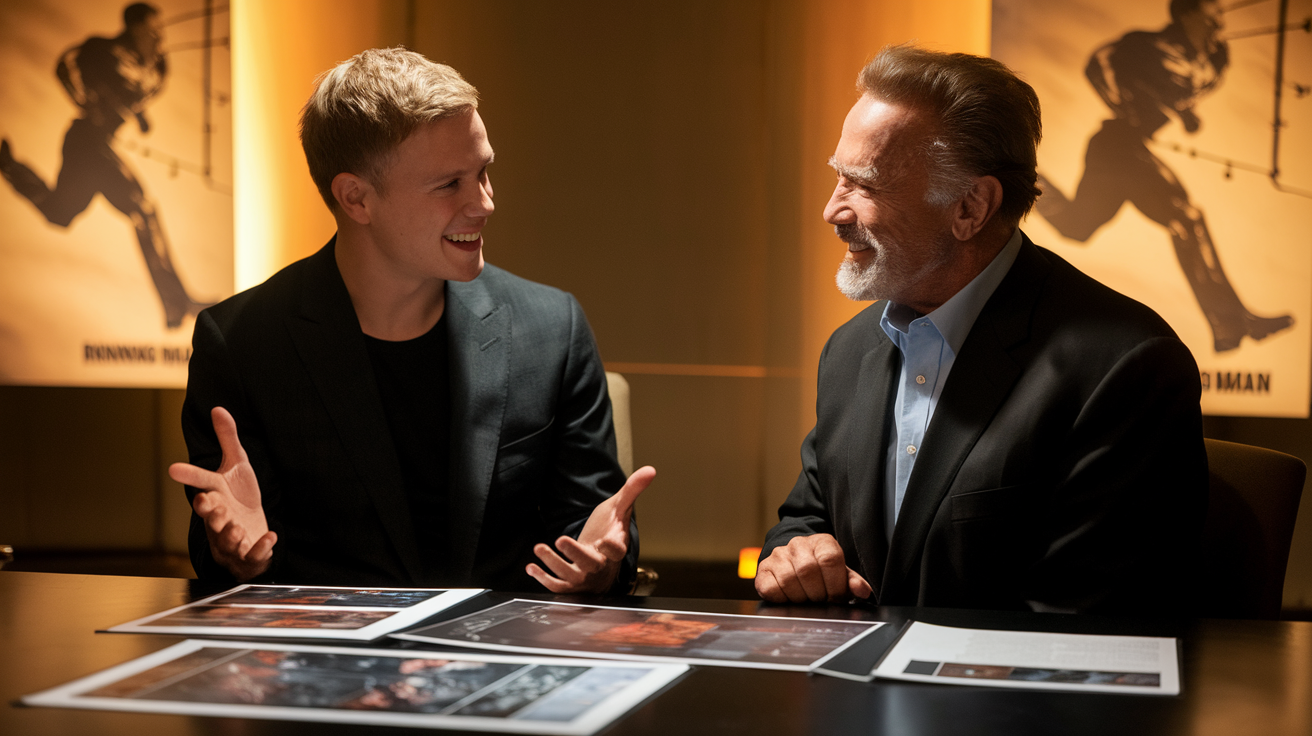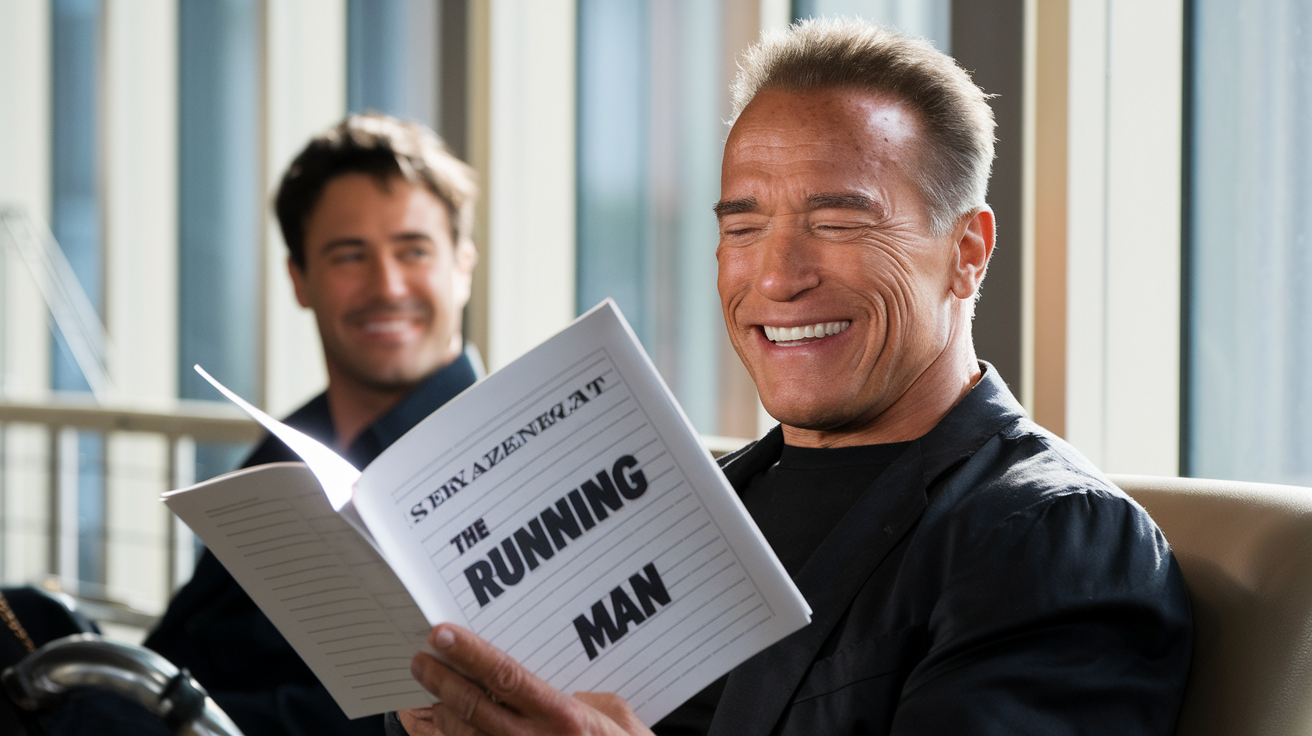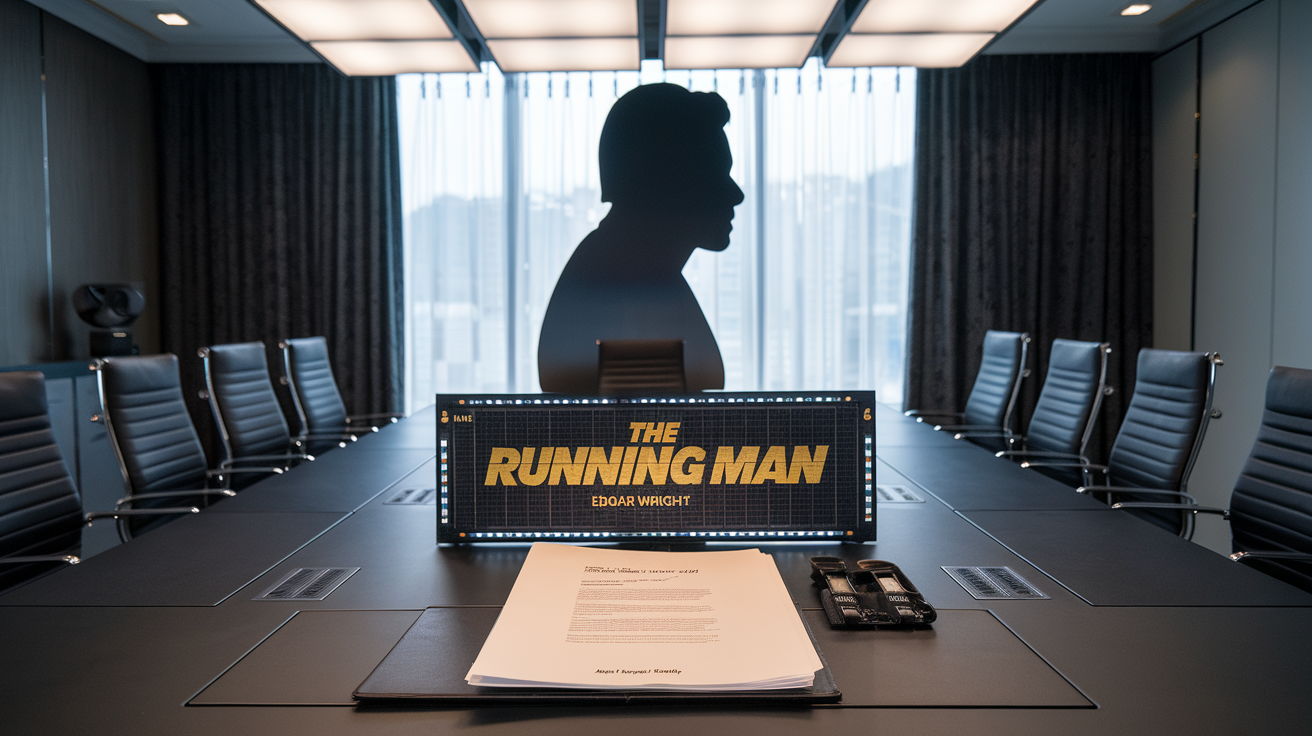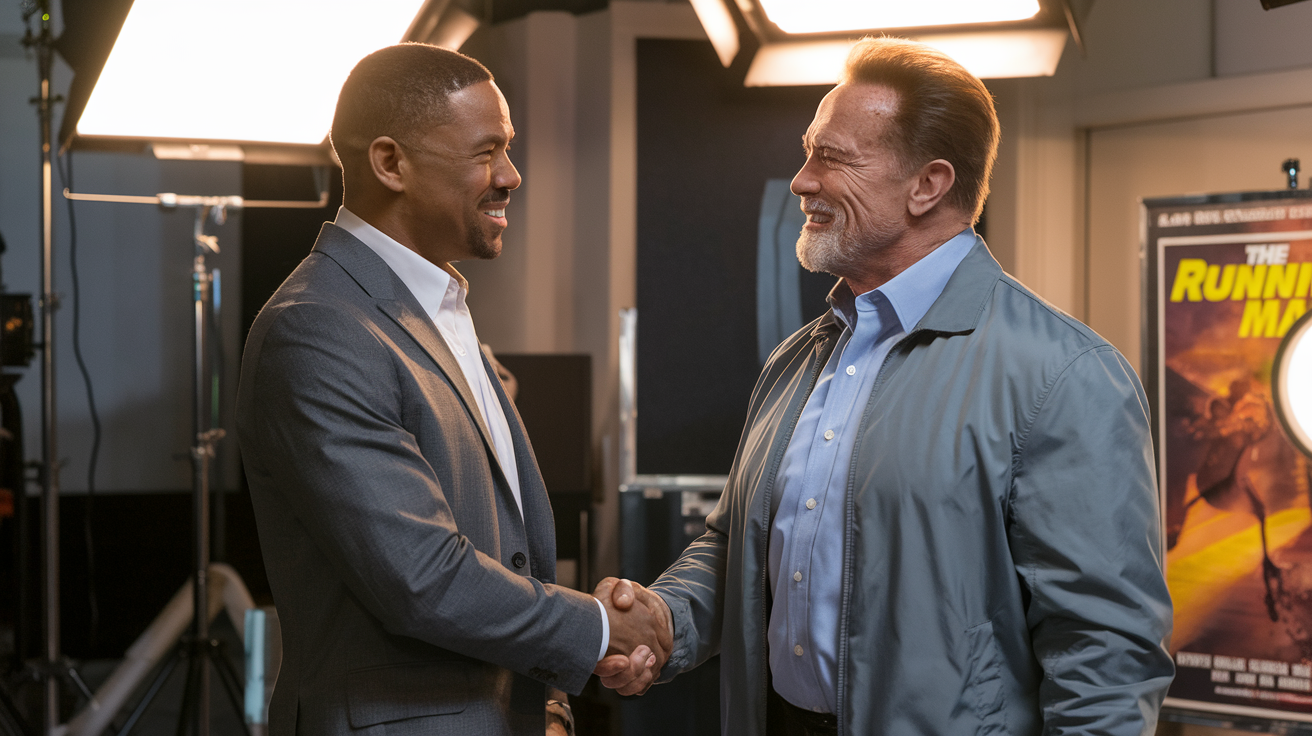How Edgar Wright Won Over Schwarzenegger for The Running Man
In a Hollywood landscape filled with remakes and reboots, getting the blessing of an original star can make all the difference. When director Edgar Wright decided to tackle a fresh adaptation of “The Running Man,” he knew one crucial step stood between his vision and success: winning over Arnold Schwarzenegger himself. Through a now-legendary Zoom call described as “incredible” and “amazing,” Wright and star Glen Powell managed to do just that, securing not just permission but enthusiastic support from the action legend for their ambitious 2025 project.
What makes a remake worthy in the eyes of its original star? According to Schwarzenegger’s candid feedback during that pivotal conversation, “out of all my films,” he felt “The Running Man” genuinely deserved a fresh interpretation. With a stellar cast now in place including Josh Brolin, Lee Pace, and Colman Domingo, this reimagining is rapidly becoming one of the most anticipated films of the year, set to hit US theaters on November 7, 2025. 🎬 Let’s dive into how Wright masterfully approached the action icon, what sparked Schwarzenegger’s enthusiastic response, and what we can expect from this exciting new take on the dystopian classic.
Edgar Wright’s Approach to Securing Schwarzenegger’s Blessing

The crucial Zoom call with the original star
Picture this: Edgar Wright, sitting nervously in front of his computer, about to call one of the biggest action stars in history. The stakes couldn’t be higher.
When Wright decided to remake “The Running Man,” he knew one thing was non-negotiable—getting Arnold Schwarzenegger’s blessing. The Zoom call that followed wasn’t just a courtesy; it was make-or-break for the project.
“I was sweating bullets,” Wright admitted in a recent interview. “You don’t just casually ring up Arnold and say ‘Hey, I’m redoing your movie.'”
The call lasted nearly two hours. Wright meticulously walked Schwarzenegger through his vision—a grittier take that would honor the original while bringing Stephen King’s novel to life in ways the 1987 film hadn’t attempted.
What sealed the deal? Wright’s passion for preserving certain iconic moments while creating something fresh. Schwarzenegger was reportedly won over by Wright’s encyclopedic knowledge of the original film, right down to quoting obscure lines that even Arnold had forgotten.
“He finished the call by saying ‘I’m in. Don’t screw it up,'” Wright recalled, mimicking Arnold’s unmistakable accent.
Glen Powell’s existing connections with Schwarzenegger
The path to Arnold’s blessing wasn’t paved by Wright alone. Enter Glen Powell, the film’s new lead, who already had Schwarzenegger’s number on speed dial.
Powell and Schwarzenegger had bonded years earlier on the set of “Terminator: Dark Fate,” where Powell had a small role that was ultimately cut. Despite this, the two maintained a friendship built on mutual respect and their shared Texas connections (Schwarzenegger filmed “Terminator” in Austin, where Powell grew up).
“Glen texted Arnold before I even had the chance,” Wright explained. “He sent him pictures from our first costume test with the message ‘Big shoes to fill.'”
This personal connection proved invaluable. Powell regularly updated Schwarzenegger on the production, sending behind-the-scenes photos and script changes that referenced the original.
Schwarzenegger appreciated these gestures so much that he surprised the cast with an unannounced set visit during the filming of a particularly brutal game show sequence—a moment that Powell described as “surreal and terrifying in equal measure.”
The significance of seeking approval for homages to the 1987 film
Wright didn’t just want Schwarzenegger’s blessing—he wanted his active involvement in shaping how the new film would reference the original.
This wasn’t about playing it safe. It was smart filmmaking. The 1987 version, while diverging wildly from King’s novel, created cultural touchstones that viewers expect: catchphrases, distinctive visuals, and that unmistakable Schwarzenegger swagger.
Wright created a detailed “homage document” highlighting every reference planned for the new film. Some were subtle (identical camera movements during key sequences), while others were more overt (modernized versions of the original’s game show death matches).
“Arnold actually vetoed a few,” Wright revealed. “He’d say ‘This line never worked for me’ or ‘I always hated this costume.'” These insights proved invaluable, allowing Wright to focus on elements that even the original star felt were worth preserving.
The approval process created something unexpected: a genuine collaboration between past and present. Schwarzenegger provided notes on early cuts, suggesting tweaks to make certain homages land better with audiences familiar with the original.
This mutual respect between filmmakers across generations ultimately gave Wright the confidence to take bigger risks with his adaptation.
Schwarzenegger’s Enthusiastic Response

His view that “The Running Man” deserved a remake
When Edgar Wright approached Arnold Schwarzenegger about remaking “The Running Man,” the action icon didn’t need much convincing. Schwarzenegger had actually been thinking for years that the 1987 film deserved another shot at the big screen.
“I always felt we only scratched the surface with the original,” Schwarzenegger revealed in a recent interview. “The world has changed so much since then, and the themes of reality TV, media manipulation, and government control are even more relevant today.”
What really surprised Wright was how enthusiastic Schwarzenegger seemed about having someone else take on the project. Most stars might be protective of their legacy films, but Arnold was the opposite.
“The original was made during a crazy time in my career when I was doing three or four movies back-to-back,” Schwarzenegger explained. “There were ideas in the book we never got to explore.”
The “incredible” conversation details
According to Wright, their initial conversation was supposed to be a quick 15-minute pitch call that turned into a two-hour deep dive into Stephen King’s original novel (written under the pseudonym Richard Bachman), the 1987 film’s production challenges, and where a new version could go.
“Arnold remembered every detail from the original production,” Wright said. “He was finishing my sentences about the book and throwing out ideas that showed he’d really thought about this world.”
The conversation took an unexpected turn when Schwarzenegger started pitching ideas to Wright rather than the other way around.
“He had this whole vision about how the game show element could work in today’s social media landscape,” Wright shared. “He was practically writing the script during our call!”
What truly floored Wright was Schwarzenegger’s media analysis. “Arnold broke down how reality TV has evolved since the 80s and had specific thoughts about how a dystopian game show would operate in our current media environment. His insights were genuinely brilliant.”
Official blessing for Wright’s vision
After their marathon brainstorming session, Schwarzenegger didn’t just give Wright permission to proceed – he became the project’s biggest champion.
“Edgar’s the perfect director for this,” Schwarzenegger told studio executives at a green-light meeting. “He understands action, comedy, and most importantly, how to make social commentary entertaining.”
The action star even offered to make a cameo appearance, though he insisted it shouldn’t distract from the new direction. “This isn’t about me,” he said. “It’s about getting the story right this time.”
Schwarzenegger formally announced his endorsement at ComicCon, surprising fans by bringing Wright on stage during what was supposed to be a retrospective panel about his 80s films.
“Sometimes you need to let go of the past to do justice to great material,” Schwarzenegger told the shocked audience. “Edgar’s vision for ‘The Running Man’ is exactly what this story deserves.”
The New “Running Man” Project Details

A. Star-studded cast featuring Josh Brolin, Lee Pace, and Colman Domingo
Edgar Wright’s reimagining of “The Running Man” is shaping up to be one of the most anticipated films of late 2025, and the cast is a major reason why. Josh Brolin has signed on to play the ruthless game show producer who orchestrates the deadly competition at the heart of the story. Brolin’s intensity and commanding screen presence make him perfect for the role originally portrayed by Richard Dawson in the 1987 version.
Lee Pace joins the project as the government official who sanctions the brutal competition. After his standout performances in “Foundation” and various MCU projects, Pace brings the perfect blend of charisma and menace to the dystopian world Wright is creating.
The real coup might be landing Colman Domingo, fresh off his Oscar win earlier this year. Domingo will play a former champion of the deadly game who now works behind the scenes. His character reportedly serves as both mentor and potential ally to the protagonist.
B. Glen Powell stepping into the lead role
In what might be the most talked-about casting decision, Glen Powell is taking on the lead role of Ben Richards (the character originally played by Schwarzenegger). Powell’s star has risen meteorically since “Top Gun: Maverick” and “Anyone But You,” making him one of Hollywood’s most sought-after leading men.
Powell brings a different energy than Schwarzenegger did to the original. Where Arnie was all brute force and one-liners, Powell combines physical capability with a more cerebral approach. In recent interviews, Powell mentioned spending time with Schwarzenegger to discuss the role, calling it “intimidating but incredibly valuable.”
Wright has emphasized that Powell won’t be doing an Arnie impression but rather bringing his own interpretation to the character. The script reportedly leans more heavily on the original Stephen King novella (published under his Richard Bachman pseudonym) than the 1987 film did.
C. Confirmed release date: November 7, 2025
After production delays that pushed the project back twice, Paramount has locked in November 7, 2025, as the official release date for “The Running Man.” This strategic positioning puts it right in the heart of awards season while still capitalizing on the big holiday movie rush.
The studio is clearly confident in Wright’s vision, giving the film a prime release slot usually reserved for potential blockbusters with awards potential. According to industry insiders, early footage shown at CinemaCon last month blew executives away.
Principal photography wrapped in April, and Wright is now deep in post-production. The director’s meticulous approach to editing means the extensive post-production timeline isn’t surprising – his unique visual style requires significant time to perfect the kinetic energy he’s known for.
The November release also provides enough separation from other major sci-fi releases in 2025, giving “The Running Man” room to breathe at the box office.

Edgar Wright’s journey to remake “The Running Man” demonstrates the importance of honoring cinematic legacy while bringing fresh vision to beloved properties. By seeking Schwarzenegger’s blessing through that memorable Zoom call, Wright and Powell showed genuine respect for the original 1987 film that resonated deeply with the action star. Schwarzenegger’s enthusiastic endorsement—stating that out of all his films, “The Running Man” was truly worthy of a remake—gives this project a special significance in his extensive filmography.
With a stellar cast including Josh Brolin, Lee Pace, and Colman Domingo joining the production, anticipation continues to build for the November 7, 2025 release. As Wright’s reimagining takes shape, fans can look forward to a film that pays homage to the original while standing on its own creative merits. This collaboration between an innovative director and the iconic star who helped define action cinema promises to deliver a “Running Man” for a new generation, born from mutual respect and creative passion.
